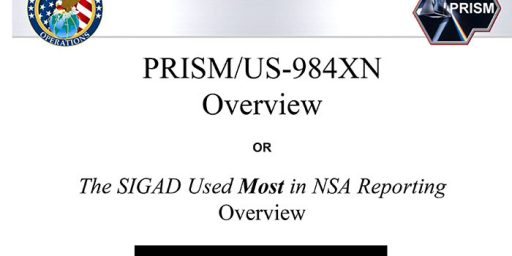Privacy Group Petitions Supreme Court Over FISA Court
A privacy rights group has filed a Petition with the Supreme Court regarding recent actions by the FISA Court.
The Electronic Privacy Information Center (EPIC), an advocacy group for privacy and other rights online that’s been around for some twenty years now and been heavily involved in legal and legislative battles throughout that period, has taken the unusual step of filing a petition with the Supreme Court regarding the actions and decisions emanating from the Court authorized by the Foreign Intelligence Surveillance Act:
WASHINGTON — A privacy rights group plans to file an emergency petition with the Supreme Court on Monday asking it to stop the National Security Agency’s domestic surveillance program that collects the telephone records of millions of Americans.
The group, the Electronic Privacy Information Center, says it is taking the extraordinary legal step of going directly to the Supreme Court because the sweeping collection of the phone records of American citizens has created “exceptional circumstances” that only the nation’s highest court can address.
The group, based in Washington, also said it was taking its case to the Supreme Court because it could not challenge the legality of the N.S.A. program at the secret court that approved it, the Foreign Intelligence Surveillance Court, known as the FISA court, and because lower federal courts did not have the authority to review the secret court’s orders.
In its petition, the group said the FISA court had “exceeded its statutory jurisdiction when it ordered production of millions of domestic telephone records that cannot plausibly be relevant to an authorized investigation.”
The suit is the latest in a series of legal challenges to the N.S.A.’s domestic spying operations that have been filed over the past month after disclosures by a former N.S.A. contractor, Edward J. Snowden. Based on a document leaked by Mr. Snowden, The Guardian revealed early last month that the FISA court had issued an order in April directing Verizon Business Network Services to turn over all of the telephone records for its customers to the N.S.A. The secret court order was also published by The Guardian.
Within days of the disclosure of the court order, the American Civil Liberties Union filed suit in federal court in New York. Separately, Larry Klayman, a conservative lawyer who runs a group called Freedom Watch, filed a class-action lawsuit in federal court in Washington on behalf of Verizon customers.
Marc Rotenberg, the executive director of the Electronic Privacy Information Center, said his group’s lawsuit would be the first to directly challenge the legal authority of the FISA court to approve the phone records’ collection under the Patriot Act.
Alan Butler, a lawyer for the group, said the judge “lacked the authority to require production of all domestic call detail records.” He noted that the Patriot Act provision cited by the FISA court required that the business records produced be “relevant” to an authorized national security investigation. “It is simply implausible that all call detail records are relevant,” Mr. Butler said.
The new challenges come after the failure of a legal campaign against the N.S.A.’s domestic spying operations during the administration of President George W. Bush. A series of lawsuits were brought against an N.S.A. program of wiretapping without warrants soon after the existence of the program was revealed by The New York Times in December 2005.
SCOTUSBlog’s Lyle Denniston comments on the filing:
Attached to the petition is a copy of an order dated April 25 and signed by Roger Vinson, a U.S. District Court Judge who sits in Florida but who issued this order in his temporary capacity as a judge of the FIS Court. Because that order was issued in secret, the petition noted, it is not officially on record anywhere. All judges who sit temporarily on that court and pass upon government intelligence surveillance requests are named by Chief Justice John G. Roberts, Jr.
What that order mandated, EPIC argues, is the “production of millions of domestic telephone records that cannot plausibly be relevant to an authorized investigation.” And, because of the structure of the federal law setting up the FIS Court and directing its operations, the petition said, “no other court may grant the relief that EPIC seeks.”
Under the law at issue, EPIC says, the compelled disclosure to the government of “tangible things” must involve only items that are relevant to a foreign intelligence investigation. “It simply is not possible that every phone record in the possession of a telecommunications firm could be relevant to an authorized investigation. Such an interpretation [of the law] would render meaningfless the qualifying phrases contained in the provision and eviscerate the purpose of the Act.”
Legal efforts in the past to challenge NSA intelligence surveillance have failed in various federal courts, including, most recently, in the Supreme Court itself. In February, in the case of Clapper v. Amnesty International, the Court blocked a lawsuit by a group of journalists, lawyers, and advocates to review the legality of NSA’s global monitoring of private telephone, cable, and Internet communications. The Court ruled that no one involved could show that they had been, or might in the future be, monitored by the program.
With the happenstance leak of Judge Vinson’s order to the telephone giant Verizon, EPIC’s lawyers hoped to get past that legal barrier. Their new filing argues that Judge Vinson’s order “implicates the privacy interests of all Verizon customers.” They noted that EPIC “engages in protected attorney-client communications as it pursues litigation to safeguard privacy.”
The law creating the FIS Court, the filing notes, “does not allow Verizon customers, including EPIC, to challenge the order [by Judge Vinson] or seek review of the order” either before the special court or before the special appeals court that has the authority to review FIS Court actions. As a result, the petition argues, EPIC “can only obtain relief” from the Supreme Court. While conceding that the specific step it is taking involves “an extraordinary remedy,” it adds that “the Verizon order carries extraordinary ramifications.”
This is something of a unique issue, and indeed a unique strategy for approaching it by applying directly to the Supreme Court rather than starting down at the District Court level as other cases challenging the National Security Agency’s surveillance programs have done. Essentially, EPIC is arguing that because there is no way for them to appeal an order from a FISA Judge, their only option is to go to the Supreme Court and request what’s called a Writ of Mandamus. In layman’s language, they are essentially asking the Supreme Court to give specific direction to the FISA Court regarding the orders that it issues in these surveillance cases, specifically one that would prohibit that Court from issuing the kind of orders that allow the metadata collection. The odd thing about this argument, at least at the surface, is that these are programs that are authorized by the law so its hard to say how the FISA Court is exceeding its authority by authorizing actions by the NSA that are permitted by laws that have been been passed by Congress. Nonetheless, one has to give EPIC credit for taking such a bold legal step in going directly to the Supreme Court.
Where things go from here is anyone’s guess. With the Supreme Court on summer recess and not scheduled to meet again to discuss pending petitions for two months or more, it’s possible that they won’t take any action at all. In this era of electronic filing, though, it’s not at all difficult for all nine of the Justices and their clerks to review this filing over the break and, perhaps, issue some kind of preliminary order. They could summarily dismiss the entire matter or rule that the Petition was not appropriately filed, meaning that EPIC would have to start back down at the District Court level. They could ignore the matter until their next conference and act on it then. Or, they could ask the government to file a response. That last action would be the best that EPIC could hope for out of the case at this point, because it would be first step in a process that might lead to a hearing on the merits of their Petition. It also, I think, happens to be the most unlikely outcome at this point, but we shall see.
Here’s the Petition:







This is good news, and I hope they continue to press the issues with Congress too. We need to have a discussion on this. Perhaps this sounds naïve but, I do not see this as a partisan issue. It’s time to consider the scope and reach of the national security state.
I’m not optimistic on this one. The current Supreme Court has heavily favored the government’s wishes when it comes to claimed issues relating to national security and I don’t see the conservative wing changing its mind.
@Ben Wolf:
It’s not just the “conservative wing” that will rule against this one. The whole reason Elena Kagen was selected to sit on the court was her deference to the rights of the Executive Branch. This is the quid pro quo. She will do what she was put there to do.
I don’t see them agreeing to get anywhere near the merits in this.
Not holding my breath.
@HarvardLaw92:
Agreed. A problem is that a lot of non-lawyers don’t grasp the concept of standing and think that the courts are just there to resolve pressing legal issues. Actually, the courts are there to resolve claims of harm. If no party is harmed, then there is no legal claim before the court, and the lawsuit will be dismissed.
This is where Michael Reynolds’ perennial question becomes relevant, as well as the civil libertarians here inability to answer it. The NSA can gather any amount of phone metadata it wants, for what ever purposes it wants, but since no one has a reasonable expectation of privacy in the data, there is no justiciable claim for the courts to decide. It’s an issue for Congress, and Congress thinks this is OK. And around and around it goes.